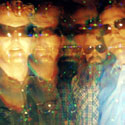
Wooden Shjips
Bob Ham
Wooden Shjips understands the simple idea that bands like Suicide, Neu!, and even the JB’s all had ingrained in their DNA – find a riff or a chord progression and ride it until you can’t see straight. The band has, since its inception, taken this idea and swathed in the dusky haze of psychedelia that, when coupled with the band’s lo-fi recordings, imbues their music with a secretive feeling; it’s as if you lived three stories up from The Factory and were still able to eavesdrop on the party going on below you. The quartet – featuring Erik “Ripley” Johnson (guitar/vocals), Nash Whalen (organ), Dusty Jermier (bass), and Omar Ahsanuddin (drums) – have only released a few records, including their most recent album Holy Mountain, but they, as well as the band’s hypnotic live shows, have won the Shjips fans from both the critical world and from amongst their fellow musicians.

Ink 19’s Bob Ham had a chance to speak with Johnson, via email.
• •
How did the band get started? Did you join forces knowing that you wanted to play the kind of music that you do or did you dabble in any other genres?
The band actually started as an experiment. A few years ago I had the idea to start a band with all non-musicians and play very primitive, improvisational rock and roll. After a while that imploded and we disbanded. I wanted to keep playing music in that vein. It just happened that Dusty and Omar, who I’ve known for a long time, were both looking for a musical project. They actually are musicians, which made things easier. Nash was part of the first incarnation of the band, on guitar. I asked if he wanted to join us on organ, though he had never really played one. He has a natural ear for music.
The sound of your recordings tends to lean toward a more lo-fi, analog aesthetic. Is this a predetermined approach or did it just happen that way due to the recording equipment you have?
I appreciate the lo-fi aesthetic, but it’s really a product of working with what we have. We’ve worked with cassette 4-track and a little bit of digital. For the Holy Mountain record we bought a used reel-to-reel 8-track. So that was an upgrade, but we’re still recording in our practice space, which is challenging. We do choose to record analog. It would be easier to go digital, but we enjoy the analog process and sound.
As well, you seem to like putting out your work in small doses on 7” records. Are all of you in the band vinyl collectors?
None of us are collectors. We all have vinyl. Some more than others. Nash and I buy it regularly and I choose vinyl over digital when possible. We release 7” records because they’re great little artifacts. Like a little art object. I think they’re wonderful. And I’m not a fan of CD-Rs.
What do you think about the response to your work that read something like “in a year we’re going to be sick of talking about ‘modern psychedelia’”? Is that even the way you would describe your band?
It’s as good a term as any, I suppose. Thankfully it’s not our job to write about what we do. As far as getting sick of “modern psychedelia”, there are certainly more bands around today that could fit in that category. I could imagine getting sick of having to write about it, if that’s what you do. But whenever trends pass there are bands who continue on in obscurity. Though I’m not sure that trends die anymore. Look at the ’80s revival.
You have gotten very positive press notices from luminaries like Byron Coley and David Fricke. Is that an exciting notion for you? Does it affect you and the band at all?
It’s great. And Byron Coley and David Fricke are both incredibly nice people. So that makes it even better. I think it mostly affects us indirectly, in that it changes the way some people might view us. It’s a stamp of approval. It’s very gratifying and it is encouraging.
What are the future plans for the band?
We try to play out as often as possible. We have work, and some of us have school (and work), so we do what we can. Our immediate plan is to record another album. And we’re working on music for a short film project for a Chilean director. After that I guess we’ll see if everyone’s tired of modern psychedelia.












